Changelog
 Firekeeper
FirekeeperCelo is now supported by thirdweb's EIP-7702 stack - you can now use our sponsored 7702 execution mode in the SDK (or implicitly, send transactions via the thirdweb API)
Documentation for sponsoring transactions available here.
 Firekeeper
FirekeeperHyperliquid is now supported by thirdweb's ERC-4337 stack - you can now use Smart Wallets on Hyperliquid Testnet & Mainnet.
We hope to integrate EIP-7702 relaying as well once the HyperEVM supports it.
Documentation for sponsoring transactions available here.
 Prithvish Baidya
Prithvish BaidyaFollowing our recent announcement of Solana API support, we're excited to bring Solana server wallet management directly into the thirdweb dashboard. You can now create, manage, and test Solana wallets through an intuitive interface, no code required.
Dashboard Support for Solana Server Wallets
The Vault in your project dashboard now supports Solana! Upgrade your vault to unlock the ability to create and manage Solana server wallets directly from the UI. Every wallet you create is immediately available for use with the Solana API we announced previously.
Create Solana Server Wallets
Navigate to Transactions in your project sidebar and locate the Server Wallets card. If you're on an existing project, you'll be prompted to upgrade your vault to enable Solana support. New projects have this enabled by default. Just click "Create Wallet", select Solana as your chain, give it a label, and your wallet is provisioned instantly. No keypair management, no security headaches.
Each wallet gets:
- A unique Solana address (mainnet and devnet supported)
- Automatic secure key management
- Immediate API access via your project's secret key
- Full transaction history and monitoring
Send Test Transactions
Before going live, test your setup directly in the dashboard. The built-in transaction interface lets you send a 0 SOL transaction and view transaction status in real-time.
Perfect for testing integrations, verifying wallet balances, or running through your transaction flows before deployment.
Seamless API Integration
Every dashboard-created wallet works immediately with the Solana API endpoints:
- Use
POST /v1/solana/sendto transfer tokens programmatically - Submit custom transactions with
POST /v1/solana/transactions - Sign messages with
POST /v1/solana/sign-message - List all your wallets with
GET /v1/solana/wallets
Your wallet's label and address are available in both the dashboard UI and via API, making it easy to manage wallets across your team and your applications.

- Navigate to Transactions
From your project dashboard, click "Transactions" in the sidebar. - Upgrade Vault (Existing Projects Only)
In the Server Wallets card, click "Enable Solana" if prompted. New projects can skip this step, Solana support is already enabled. - Create Your First Wallet
Click "Create Wallet", select "Solana" as the chain, choose mainnet or devnet, and give it a descriptive label like "my-treasury-wallet". - Send a Test Transaction
Click into your new wallet and use the "Send" interface to transfer some SOL. Watch the transaction confirm in real-time. - Use with API
Copy your wallet address and start using it with the Solana API endpoints. Authenticate with your project's secret key via thex-secret-keyheader.
Click on any transaction to view comprehensive information including signature, signer address, slot number, confirmation time, block time, and instruction-level details. The detailed view breaks down each instruction with program IDs, account metadata, and raw transaction data. Perfect for debugging and understanding exactly what happened on-chain.

 Firekeeper
FirekeeperIntroduces a new GET /v1/bridge/routes endpoint to list supported bridge routes with pagination and optional filters for source/destination chains and tokens.
- GET /v1/bridge/routes — list all supported bridge routes
- Supports filters:
- by origin/destination chain
- by token address
- by max steps (e.g. single-hop routes)
- Pagination with
limit,page, andhasMore
 Manan Tank
Manan TankImproved Transaction Details page - now with Bridge Status and a cleaner, explorer-style design
Transactions that are part of a bridge now display a dedicated Bridge section showing cross-chain details, token amounts, and status.
Example: https://thirdweb.com/polygon/tx/0x28486b565957a64eec8e408f149e796d455537f360b23442e51cbec812df233f

The general transaction details layout has been updated to align with the standard design used in most chain explorers, making it more user-friendly

 Manan Tank
Manan TankWe’ve added a new Webhook Events view for Bridge webhooks to help monitor and debug webhook deliveries more easily.
You can now:
- View all delivery attempts - see every webhook event sent to your endpoint, along with status codes, timestamps, and payload details.
- Inspect payloads and responses - review the exact JSON payload and the response returned by your endpoint.
- Resend webhooks - trigger a webhook delivery again with the same payload, which is useful for testing or retrying failed events.

 Firekeeper
FirekeeperWe're proud to announce initial support for Solana via the thirdweb API. This is the first of many releases making Solana more accessible to Ethereum developers.
Note: For the time being, you must create a new project from the thirdweb dashboard and use its secret key (server-side) to authenticate to the Solana APIs via the x-secret-key header.All Solana endpoints are available at https://api.thirdweb.com/v1/solana/* and require authentication via the x-secret-key header:
The API supports both Solana Mainnet (solana:mainnet) and Solana Devnet (solana:devnet) networks.
Create or retrieve a managed Solana wallet using a unique label. If a wallet with the given label already exists, it will be returned instead of creating a new one.
Endpoint: POST https://api.thirdweb.com/v1/solana/wallets
Example Request:
Example Response:
The wallet is securely stored and can be used for signing transactions and messages.
Retrieve all Solana wallets created for your project with pagination support.
Endpoint: GET https://api.thirdweb.com/v1/solana/wallets
Query Parameters:
page(optional): Page number, defaults to 1limit(optional): Number of wallets per page (1-500), defaults to 100
Example Request:
Example Response:
Transfer native SOL or SPL tokens with a single API call. The API automatically handles SPL token account creation if needed.
Endpoint: POST https://api.thirdweb.com/v1/solana/send
Example Request:
Note: Amounts are specified in lamports (1 SOL = 1,000,000,000 lamports)
Example Request:
Example Response:
Transactions are queued and processed asynchronously. Use the returned transactionId to poll for status.
For advanced use cases, submit custom Solana transactions with one or more instructions. This gives you full control over program interactions.
Endpoint: POST https://api.thirdweb.com/v1/solana/transactions
Example Request (SOL Transfer):
Instruction Fields:
programId: The Solana program to invokeaccounts: Array of account metadata (address, isSigner, isWritable)data: Instruction data in hex or base64 encodingencoding: Either "hex" or "base64" (defaults to "base64")
Example Response:
Check the status of any queued transaction using its transaction ID.
Endpoint: GET https://api.thirdweb.com/v1/solana/transactions/{transactionId}
Example Request:
Example Response:
Transaction Statuses:
QUEUED: Transaction is waiting to be submittedSUBMITTED: Transaction has been submitted to the networkCONFIRMED: Transaction is confirmed on-chainFAILED: Transaction failed (checkerrorMessagefor details)
Sign arbitrary messages with your Solana wallet. Supports both plain text and hexadecimal formats with automatic detection.
Endpoint: POST https://api.thirdweb.com/v1/solana/sign-message
Example Request (Plain Text):
Example Request (Hex Format):
Example Response:
The signature is returned in Base58 format and can be used for authentication and verification.
We're actively working on expanding our Solana support. Here's what's coming next:
High-performance, globally distributed RPC endpoints optimized for Solana applications.
Seamlessly swap tokens on Solana with the best rates from top DEXs like Jupiter and Raydium.
Deploy your own SPL tokens with a single API call, including support for Token-2022 program features.
We can't wait to see what you build with Solana on thirdweb! 🚀
 Yash Kumar
Yash KumarWe have added support for creating and deploying ZK Proof based token contracts with Stylus. The templates provide you with Stylus contracts, ZK circuit files, and a ready-to-deploy Next.js app + API for proof generation and minting.
This guide walks you through building a privacy-preserving ERC721 token system using Zero-Knowledge proofs on Arbitrum Stylus. Users can mint tokens by proving they own a minimum amount of ETH without revealing their exact balance.
- ZK Circuit: Proves token ownership without revealing exact balances
- Stylus Contract: Rust-based ERC721 contract that verifies ZK proofs
- Frontend: Next.js app for generating proofs and minting tokens
- Oracle System: Secure balance verification mechanism
- Node.js (>= 20.18.0)
- pnpm package manager
- Rust with cargo
- circom for ZK circuits
- Stylus CLI for contract deployment
Select "Stylus ZK ERC721" from the dropdown menu. This will:
- Clone the repository to your machine
- Set up the project structure
- Install basic dependencies
Install dependencies for all components:
Run the setup script to generate oracle keys and build the ZK circuit:
This script will:
- Generate a random oracle secret key
- Inject the secret into the ZK circuit
- Compile the circuit with circom
- Generate proving and verification keys
- Create the trusted setup for Groth16
⚠️ Important: The oracle secret is critical for security. Keep it private!
Copy the deployed contract address - you'll need it for the frontend.
Update the contract address in your frontend:
Create environment file:
- Connect Wallet: Connect to Arbitrum Sepolia testnet
- Generate Proof: Click "Generate ZK Proof" - this proves you have sufficient balance
- Mint Tokens: Use the proof to mint ERC721 tokens
The core circuit (circuits/token_ownership.circom) has these components:
Replace the balance check with custom logic:
Extend the circuit to verify multiple token balances:
Add expiration logic to proofs:
After modifying the circuit:
Need help? Please reach out to our support team.
 Manan Tank
Manan TankWe’ve made several updates to the BuyWidget component to make it more flexible, interactive, and user-friendly - giving users more control while simplifying integration.

Clicking on the selected token opens a Modal that allows changing the selected chain and token. chain, and amount props are now optional

Both the fiat and token amount fields can be edited, making it easier to input custom fiat amounts beyond just selecting the suggested fiat amounts.
The wallet's current balance is also shown in the bottom-right corner which helps in choosing the buy amount

A button is added on the top-right corner that shows the connected wallet, Clicking on it opens the Wallet Details modal, which allows switching the active wallet or disconnecting the wallet

Try out the new and improved BuyWidget in playground
 Firekeeper
FirekeeperTLDR: The thirdweb API from fields when transacting are now optional - this is powered by the newly launched Project Wallets - go set one up!
When you’re orchestrating transactions from your backend, repeating the same sender address in every payload is the definition of busywork. Starting today, you can skip it. Authenticate with your project’s secret key, leave off the from field, and we’ll launch those transactions straight from your project wallet.
- Automatic sender fallback for server-side flows that use your project secret key.
- Works everywhere you submit encoded calls, trigger wallet actions, deploy or write contracts, mint tokens, process payments, or swap via the bridge API.
- Still honors explicit
fromvalues when you need to override the default.
Removing boilerplate means less room for typos, quicker prototyping, and cleaner shared helpers. Your integrations stay lean while every transaction still resolves to the right wallet.
No from required—just the secret key that unlocks your project wallet.
 Firekeeper
FirekeeperWe’ve introduced Project Wallets as a first-class part of the dashboard so every project comes with a managed server wallet you can see, fund, and control right from the overview screen.
The Project Wallet section will stick around under Overview, giving teams a home base for balances, addresses, and actions.
Send funds or refresh balances right from the card, with labels and addresses trimmed for clarity.
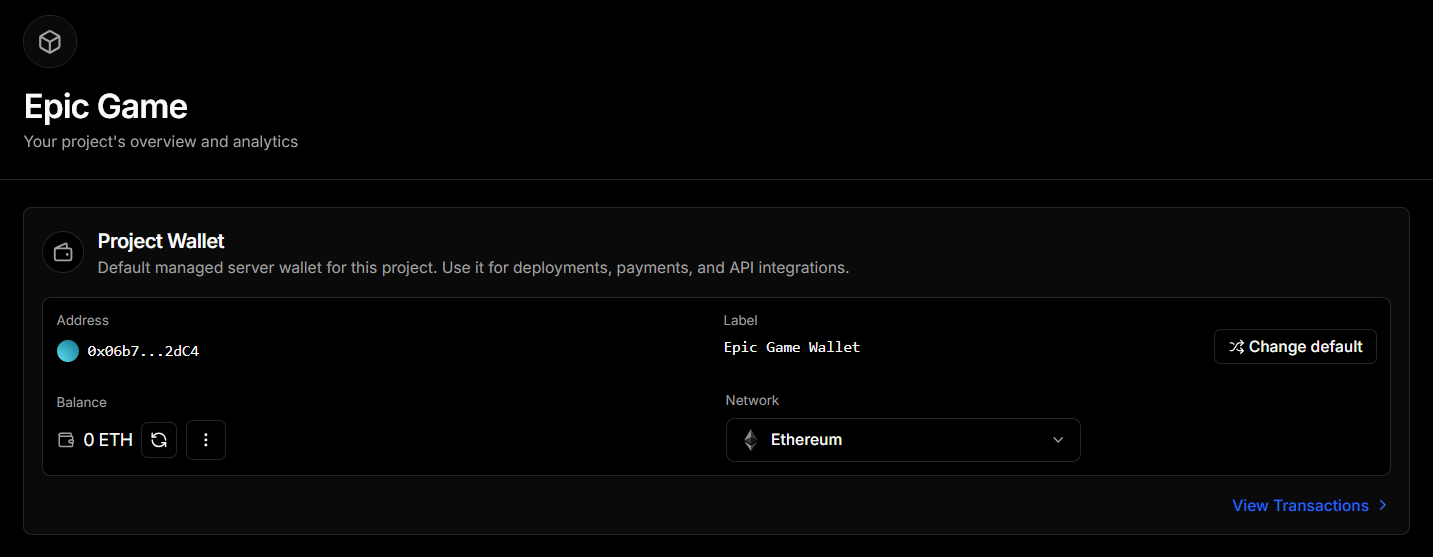
Kick off transfers or open the funding modal without leaving the page.
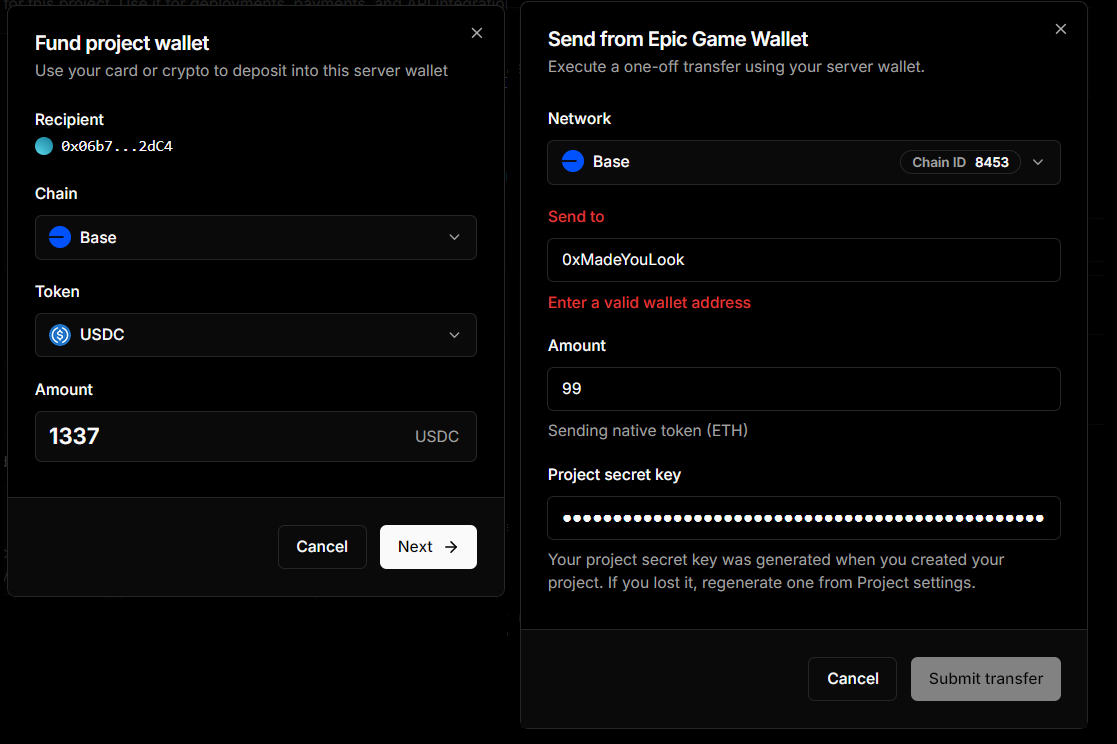
When multiple server wallets exist, pick a new default directly from the card. The change propagates instantly across integrations.
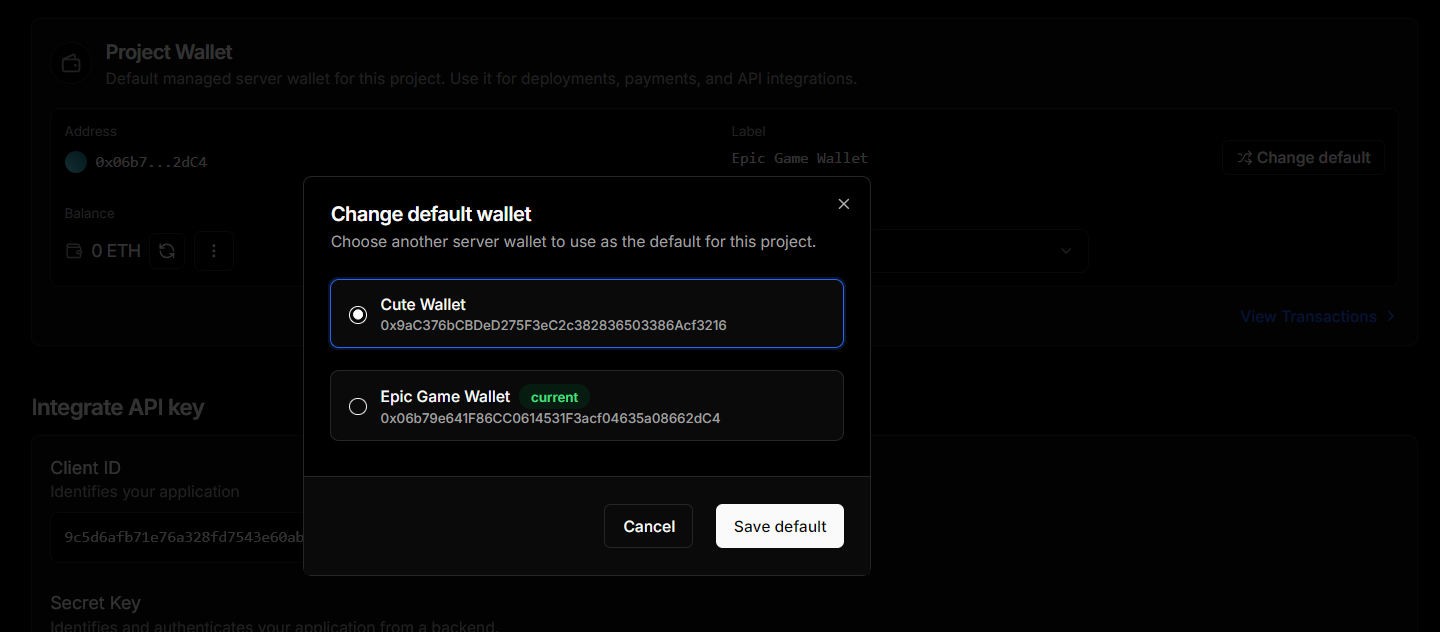
You can autifill your project wallet in the Create a Payment and Earn Fees flows.
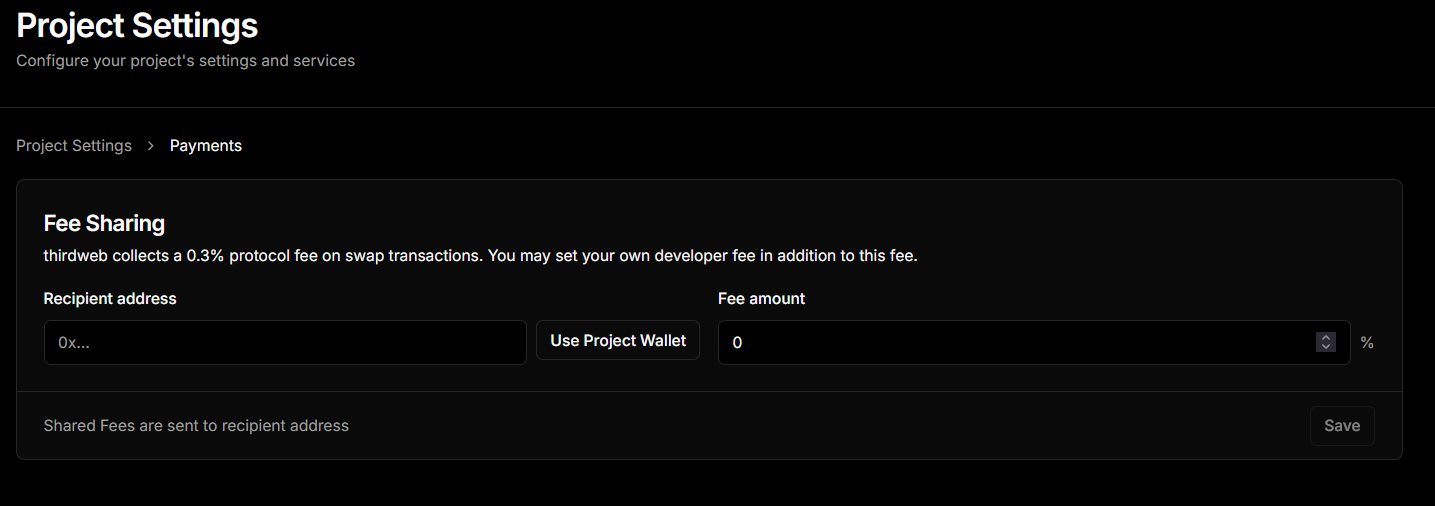
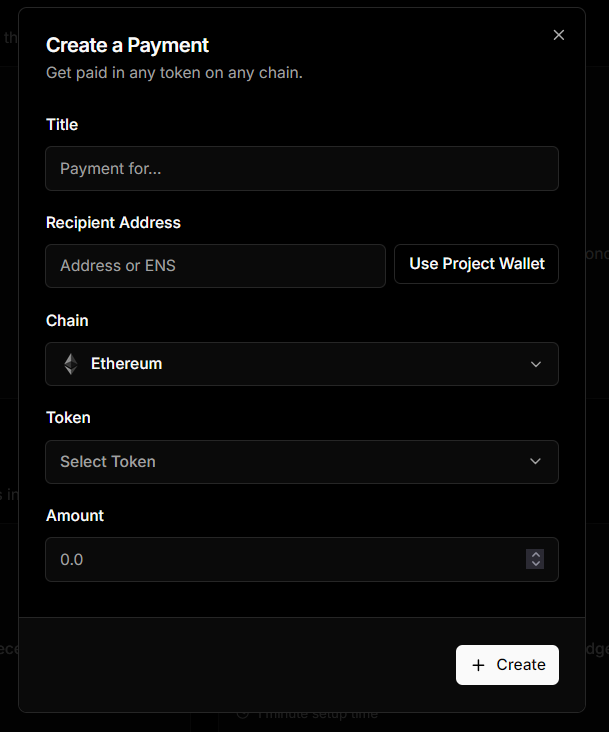
When using a managed Vault, you can use your secret key to interact with the Project Wallet - if you eject from the managed Vault, you may be prompted for an additional vault access token to interact with it. Via API, this looks like an additional x-vault-access-token header.
- Integration for gasless deployments — Token and Contract flows
- Integration into thirdweb API — will be used when a
fromaddress is not specified for your backend flows. - Integration into any Transaction Button ("Execute" flow) you might encounter during your dashboard journey, from places like contract explorers for example.
Feel free to provide feedback @ https://thirdweb.com/support
 Joaquim Verges
Joaquim VergesYou can now pay for any x402 compatible endpoint using the the new /v1/payments/x402/fetch API.
The new /v1/payments/x402/fetch in the thirdweb API proxies any url, and upon receiving HTTP 402 payment required response, automatically handles the payment with the authenticated wallet.
Query params
url- target endpoint to fetchfrom- the wallet address to pay withmethod- optional HTTP method for the endpoint to fetch (defaults to POST)maxValue- optional max amount that can be paidasset- optional payment token, if not specified defaults to the target endpoint payment methodchainId- optional payment chain, if not specified defaults to the target endpoint payment chain
Request body and headers will be forwarded to the target url.
You can use this from any language, any platform. Use it with your server wallets (using your project secret key) or with user in-app wallets (using the user JWT).
This makes is much easier to implement x402 payments for apps and agents.
Simply call this endpoint in your frontend or your agent tool to automatically pay for any x402 compatible endpoint.
Happy building! 🛠️
 Firekeeper
FirekeeperWe just shipped a pair of routes that make it painless to manage external wallets (via Sign-In-With-Ethereum aka SIWE) and other common authentication methods on user accounts. Both endpoints live under https://api.thirdweb.com and return fully normalized linked-account data so you don’t have to juggle different provider shapes.
Link an additional authentication method or wallet to your account.
Authentication Required: Client token + Wallet token
Request Body:
Response:
Unlink an authentication provider from your account.
Authentication Required: Client token + Wallet token
Request Body:
Note: At least one identifier in details is required.
Response:
 Joaquim Verges
Joaquim VergesWe're continuously improving support for HTTP 402 payments in our SDK and facilitator API. Here's what shipped this week.
- Facilitator
waitUntiloption: Choose when a payment is considered fulfilled — simulated, submitted, or confirmed. - Signature auto-detection: SDK now detects the correct signature type and EIP-712 domain/version based on asset address. No need to configure manually.
- Filters in /supported API: Filter supported tokens by chain or asset.
- New /prepare API: sign and encode payment payloads directly with the authenticated wallet.
- Revamped Playground: Select any token and try different config options in the UI. https://playground.thirdweb.com/payments/x402
- Documentation refresh: Updated guides for client, server, and facilitator APIs. https://portal.thirdweb.com/payments/x402
In case you missed it, here's what we shipped last week:
Happy building! 🛠️
 Firekeeper
Firekeeper- This release introduces breaking changes — review the migration guide for a smooth upgrade.
- Updated Unity v6 documentation is live.
- Updated .NET v3 documentation are live (all of which can be used directly in this Unity SDK as needed).
- Reduced dependencies — fewer DLLs, all updated to the latest major versions.
- Unity package size cut by 40%.
- Significant performance gains across wallet APIs.
- Includes all performance upgrades from the .NET SDK v3 release, plus full access to the Thirdweb API wrapper via
ThirdwebClient.Api. (See .NET release notes for details.)
- Removed:
MetaMaskWalletandWalletConnectWallet. - Added: Reown AppKit, the improved successor to WalletConnect.
- If you rely on external wallets, migrate to AppKit — it’s more stable, faster, and actively maintained.
- AppKit is optional and not bundled with the SDK. If you call
ConnectWalletwithWalletProvider.ReownWalletwithout setting it up, you’ll see descriptive errors guiding you through one-time setup. - Check the Migration Guide if you get stuck.
PlaygroundManagerhas been simplified for readability and ease of use.- The sample scene now includes the most common SDK features pre-wired for quick testing.
Full Changelog: v5.26.0 → v6.0.0
- Unified client and APIs
- Faster, lighter, and more efficient
- Modern dependencies and standards
- Easier wallet and transaction testing
- Architecture ready for future features
Thirdweb .NET SDK v3 evolves from separate utilities into a cohesive, high-performance platform.
Unified API Client
Highlights
- Low level generated client for thirdweb API full access, will be kept updated and the time-save will be used to make higher level APIs with nicer DX similar to the remaining ThirdwebWallet, ThirdwebContract and ThirdwebTransaction APIs.
- Consistent API design
- Easier discovery via IntelliSense
- Wraps the thirdweb API with all its features vs waiting for manual higher level integration
- Wrapper customized and adapted to work across any runtime and extended for game engine use.
Note that the core thirdweb functionality of Wallets, Contracts and Transactions is effectively free of breaking changes (new features are available). In the future, they may call into ThirdwebClient.Api while maintaining the nicer DX. There will eventually be an opinionated easier to use wrapper for each service.
Modernized Wallet Flow
Improvements
- Removed legacy signing and recovery methods from the IThirdwebWallet interface
- Removed obsolete
LegacyEncryptionKeycreaton param from In-App and Ecosystem Wallets. - Major internal cleanup of legacy Shamir sharding client side logic and AWS logic.
- Better guest wallet flows
- Smarter gas handling and bundler integration
- Removed Portable.BouncyCastle and two other Nethereum dependencies.
- Updated remaining Nethereum dependencies to Nethereum 5.0.0
- Creating an In-App or Ecosystem wallet should feel a lot faster now.
Efficiency Gains
- 30% less code (6,997 → 4,886 lines)
- 41% fewer files (44 → 26)
- Faster builds and smaller runtime
Transactions
Build System
- Modernized for faster development and testing
- If you want to contribute, we have a nice Makefile to help run things more easily
- Unified bundler (
ThirdwebBundler) - Improved gas estimation and sponsorship
- Better EIP-7702 support
- Better zkSync integration
 Firekeeper
Firekeeper- Native OAuth Integration: Added support for OAuth (social login) flows on macOS standalone builds using
ASWebAuthenticationSession, integrated into the defaultCrossPlatformUnityBrowser. - Universal Binary Support: Ships with an optimized native plugin (
libMacBrowser.dylib) containing both ARM64 and x86_64 architecture support.
- Enhanced Security & UX: OAuth flows now use the system’s native web authentication session for better security, user experience, and compliance with App Store review guidelines.
- Improved Redirect Handling: Redirects now deeplink back into the app instead of following the Desktop Windows–style flow.
- Refined Platform Detection: macOS is now properly detected and handled in authentication workflows.
- Browser Selection Logic: Updated to ensure seamless use of the native macOS session.
- Native macOS plugin (
libMacBrowser.dylib) MacBrowserclass implementation- Build instructions for compiling the plugin
- Updated browser selection logic for macOS builds
Note: This functionality only works in builds. In the Unity Editor, the original flow will still open a full browser.
Release: https://github.com/thirdweb-dev/unity/releases/tag/v5.26.0
 Yash Kumar
Yash KumarWe've redeployed bridge contracts with some updates that affect our Payments, Bridge, and Tokens products.
Users may be prompted to interact with a new contract.
- Old Contracts: 0xF8Ab2dBE6c43bf1a856471182290f91D621Ba76d, 0x7d34a477e2678c8e19d821eec103d4def4af6f4a
- New Contract: 0xdA864364f7D1ebCC7C89e9610eBdef45dDf5F81B
- ZK Contract: 0xC8EF2D40Ef314bb433f86ce2b67bA880BB48771b
 Joaquim Verges
Joaquim VergesWe've updated our x402 facilitator and SDK to support any token that supports ERC-2612 permit functionality. Supporting this popular signature standard opens up x402 payments to virtually any ERC20 token.
- x402 facilitator and SDK now auto-detects ERC-2612 permit vs ERC-3009 transferWithAuthorization (USDC) and uses the right flow.
- settlePayment and verifyPayment now accept any arbitrary chain.
Client: pay-gated fetch using x402
auto detects ERC-2612 permit when supported, and signs the payment data accordingly.
Server: verify and settle via facilitator
When verifying/settling the payment define the price in the ERC20 token of your choice. Here's an example using $higher.
Happy building!
 Manan Tank
Manan TankThe BridgeWidget Script makes it easy to embed cross-chain swaps and fiat onramp UI into your app. Just add a script tag to your HTML and get a fully customizable widget — no build setup required.

- Cross-chain token swaps across 80+ blockchains
- Fiat onramp support to buy tokens with credit/debit cards
- Customizable UI — use prebuilt themes or override with your brand colors
- Prefill token selections for a smoother user experience
- Display fiat values in multiple currencies
- Event callbacks to track user actions (success, error, cancel, disconnect)
 Joaquim Verges
Joaquim VergesWe've extended the x402 protocol to support passing arbitrary chain ids, and expanded support to 13 new mainnets and 13 new testnets. You can now accept internet-native payments across a total of 35 chains.
In v5.109.0 of the thirdweb SDK, we've introduced new APIs to verify and settle payments and updated our client side API for multichain support.
Here's an example of using settlePayment within a Next.js API route:
You can pass any chain id as the network property using the CAIP-2 notation: eip155:<chain_id>. The thirdweb facilitator will handle settling payments on the given chain using the specified token, otherwise defaults to USDC.
Simply call settlePayment in your endpoint handler, middleware or agentic tool to process a payment everytime your API is called.
Here's the list of new chains supported (mainnet + testnet)
- Arbitrum One
- Celo
- Ethereum mainnet
- HyperEVM
- Linea
- Optimism
- Plume
- Polygon
- Sonic
- Unichain
- World Chain
- XDC
Learn more:
Happy building! 🛠️